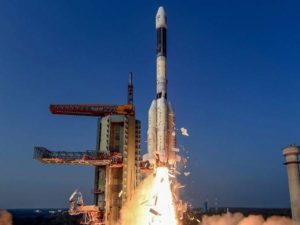
The Indian government is likely to introduce the 2017 Space Activities Bill, which will allow the commercial use of space in India, in the 2019 budget session, according to a report in the Hindustan Times.
“Steps are being taken …. So that the Bill could be possibly introduced during the Budget session 2019,” according to an answer provided to a question posed in the Lok Sabha, India’s legislative body.
After the draft of the bill was released in the public domain in November 2017, the government received 52 responses from the Indian aerospace industry, New Space startups, space law firms and experts, space policy experts, satellite communication companies, and members of the general public.
“Responses fall broadly under the category of seeking clarifications and suggestions on certain provisions, such as scope of space activities, regulatory mechanism, licencing and authorisation procedures, sharing of liability burden with a limit on damage costs, penal provisions, powers of Central Government, etc,.” the reply stated.
The 2017 Space Activities Bill aims to regulate space activities to ensure the peaceful exploration and uses of outer space. The Bill requires licensed entities to carry out operations in a manner that prevents the contamination of outer space and damage to the Earth’s environment, in accordance with India’s commitment to international treaties governing the use of space. As a result, Indian commercial space activity must not jeopardise public health or compromise Indian national security and sovereignty, according to the draft Bill that is publicly available.
“This is much needed and much awaited. Allowing commercial use will increase the domestic capacity for launches. The Indian Space Research Organisation is already hard pressed given the growing demand for communication, disaster management and several other national priority areas,” said Dr. Rajeswari Rajagopalan, head of the nuclear and space policy initiative at the Observer Research Foundation, and quoted in the Hindustan Times.
“More launches would ensure that India remains competitive in the international market having already established itself as a low-cost, reliable launcher. However, now China is also emerging so we need to increase our capacity,” Dr. Rajagopalan added.
The 2017 Space Activities Bill includes a provision for up to three years imprisonment and fines of over U.S.$140,000 if any space activity is undertaken without prior licensing, false information is provided to authorities, or if an activity pollutes the Earth, Indian airspace, outer space, or celestial bodies. The Bill also asserts that any intellectual property developed on board an Indian space object in outer space will be the property of the central government.
“The draft bill that was released proposed a model in which the government was responsible for setting the goals; the government will act as gatekeepers. Instead, everyone should be given a level playing field. The best example is NASA, its importance has not diminished just because there is a SpaceX,” said Dr. Rajagopalan.





